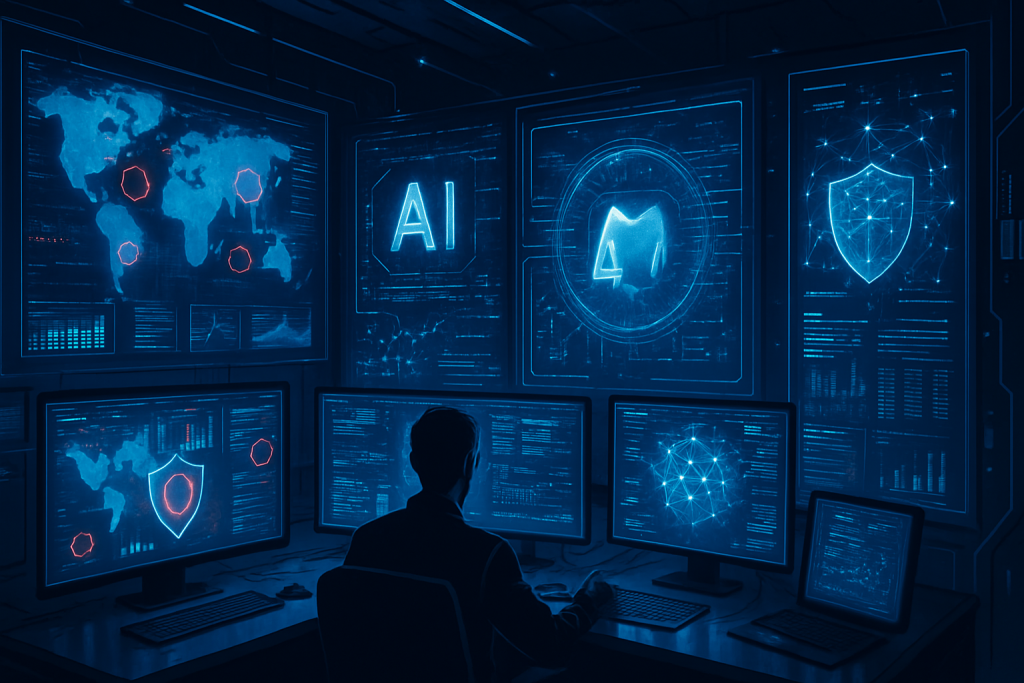Hold on to your hats, folks, because the future of cybersecurity just got a whole lot smarter – and potentially a whole lot more profitable. Palo Alto Networks, a name synonymous with digital defense, just dropped a bombshell: their fiscal 2026 outlook is brighter than a supernova, fueled by, you guessed it, the insatiable demand for AI-powered cybersecurity. Think Skynet, but instead of world domination, it’s all about keeping your data safe. (Hopefully.)
The company’s projections aren’t just optimistic; they’re practically giddy. We’re talking revenue between $10.48 billion and $10.53 billion, leaving Wall Street’s already bullish estimates eating dust. Adjusted earnings per share are also soaring above expectations, and the stock price? Well, let’s just say it enjoyed a healthy post-announcement bounce. It’s enough to make even Gordon Gekko crack a smile.
But before we start popping champagne bottles, let’s dig into what’s really driving this surge. It’s not just luck; it’s a strategic shift towards embracing artificial intelligence as the ultimate weapon in the ongoing cyber warfare. And it’s a war that’s only getting hotter. Think of it like this: traditional cybersecurity is like a medieval knight with a sword and shield. AI-powered cybersecurity? That’s the knight with a laser cannon and a predictive algorithm that can anticipate the enemy’s every move.
The rise of AI in cybersecurity is a direct response to the increasingly sophisticated and relentless nature of cyber threats. Remember those high-profile attacks on Microsoft and Oracle? Those were just the tip of the iceberg. Every day, businesses and organizations face a barrage of phishing attempts, ransomware attacks, and zero-day exploits. It’s a digital Wild West out there, and the stakes are higher than ever.
To combat these threats, Palo Alto Networks has been aggressively expanding its AI-driven product lineup. Platforms like “Cortex Cloud” and “Prisma AIRS” are designed to not only detect threats but also to learn from them, adapting and improving their defenses over time. It’s like having a security system that gets smarter every time it’s tested. And in a world where attackers are constantly evolving their tactics, that’s a game-changer.
But the company isn’t stopping there. They’re also planning a massive, $25 billion acquisition of CyberArk, a leader in identity security. This isn’t just a merger; it’s a power move. By combining Palo Alto Networks’ threat detection capabilities with CyberArk’s identity management expertise, they’re creating a cybersecurity juggernaut that can offer a comprehensive suite of solutions to clients of all sizes. Think of it as Batman teaming up with Commissioner Gordon to clean up Gotham City – only with more firewalls and fewer bat signals.
Of course, no story is complete without a bit of drama. Palo Alto Networks also announced the retirement of its founder and Chief Technology Officer, Nir Zuk, after over two decades of service. Zuk is a legend in the cybersecurity world, and his departure marks the end of an era. However, the company has tapped long-time executive Lee Klarich to take over as CTO, ensuring continuity in leadership and strategic direction. Klarich will also chair the board’s security committee, proving this isn’t just a changing of the guard, but a strategic evolution.
What does all of this mean for the future of cybersecurity? Well, for starters, it’s clear that AI is no longer a “nice-to-have” but a “must-have” for any organization that takes its security seriously. As cyber threats continue to evolve and become more sophisticated, AI-powered solutions will be essential for staying one step ahead of the bad guys. Companies that fail to embrace AI risk becoming easy targets.
But the rise of AI in cybersecurity also raises some important ethical and societal questions. Who is responsible when an AI-powered security system makes a mistake? How do we ensure that these systems are fair and unbiased? And what happens when AI is used not just to defend against cyberattacks but also to launch them? These are complex issues that we need to grapple with as AI becomes more deeply integrated into our lives.
From a financial perspective, Palo Alto Networks’ success is a clear signal that the cybersecurity market is booming. As the threat landscape continues to grow, demand for cybersecurity solutions will only increase, creating opportunities for companies that can deliver innovative and effective products. Investors who are looking for long-term growth potential should definitely keep an eye on this sector.
In conclusion, Palo Alto Networks’ strong financial outlook and strategic initiatives highlight the transformative power of AI in cybersecurity. It’s a story of innovation, adaptation, and the relentless pursuit of a safer digital world. And while the future may be uncertain, one thing is clear: the battle against cybercrime is only just beginning, and AI will be on the front lines.
Discover more from Just Buzz
Subscribe to get the latest posts sent to your email.


